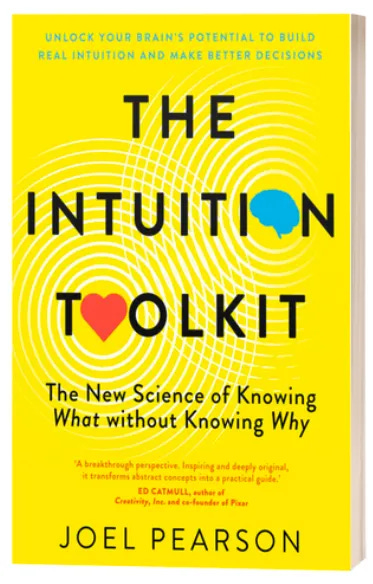Intuition And Instinct: What's The Difference, And Which Should You Listen To?
Setting the record straight on these often interchangeably used concepts.
Future Minds newsletter breaks down the science of the mind and brain into short and easy-to-digest insights and actionable take-homes. Sign up and join the many others who receive it directly in their inbox.
Hello, dear readers!
Welcome back to another edition of the Future Minds newsletter!
It’s been a busy few weeks, as I’ve been doing a series of keynotes on how to adopt and cope with the AI revolution — a topic I’ll never get tired of talking about.
I’ve also been releasing some videos about testing for Aphantasia, including this longer, in-depth one. So make sure you’re subscribed to tune in to more of these on YouTube.
Speaking of YouTube, as you might have seen, I was recently interviewed on The Rich Roll Podcast. Our nearly two-hour conversation spanned everything from mental imagery and creativity to psychedelics and the nature of consciousness. Rich has an undeniable gift for asking thoughtful questions that go beyond the obvious. And, there was one in particular that stood out:
How do you distinguish intuition from instinct?
I’ve heard several versions of this question over the years, from “How is intuition different from being psychic?” and ‘How do I know if I’m avoiding something out of intuition or anxiety?”
But, this one felt worthy of its own newsletter, as I often see these two terms — intuition and instinct — being used interchangeably. For example, you might hear people say “They’ve got killer instincts” about elite performers who seem to effortlessly adapt to their opponent’s moves — whether it’s a professional athlete or a chess grandmaster. However, what they likely actually mean in this scenario is “They have a well-honed intuition.”
Sure, there are certainly parallels between the two: in terms of the automaticity at which they seem to dictate behaviour. However, they are indeed two distinct processes. It’s important to know how to differentiate between them, because they can both show up in subtle and sneaky ways — and we can’t always trust either of them.
Here’s the difference:
Instinct: A gift from evolution
You can think of an instinct as a hardwired, automatic response that is deeply rooted in our biology. Just as newly hatched turtles will automatically make their way toward the ocean or spiders weave webs to catch their prey, these are innate, automatic behaviours that have helped us survive for millennia.
One example is the human tendency to play. From early on, infants naturally interact with things and the people around them because it’s inherently fun and rewarding. This is not a learned behaviour, but rather an innate drive that helps with the skill acquisition and connection that is crucial for human development.
Instincts are why you’ll quickly recoil your hand without conscious thought if you accidentally touch something hot like a stove. Or, why babies pucker up their faces when they taste something sour like a lemon.
While this fruit is perfectly safe for them to consume, these acidic tastes are commonly found in poisonous foods found in nature. So, the (admittedly amusing) facial expression is a rejection response that is coded into our DNA to help keep us safe. You did it as a baby and you’ll do it now, instincts are with us for life! Unlike intuition, they are not flexible and they dont adapt and change with our environment, so as the environment changes instincts remain the same.
Intuition: The sum of your past experiences
Where instinct is inborn, intuition is learned. It’s the amalgamation of all the life experience and knowledge you’ve amassed and the conversations you’ve had. It’s all the times you’ve been right about things and confirmed your hypothesis, and all the times you’ve been wrong about things and recalibrated your schema.
Often, this happens on a subconscious level. You might feel it as a pang or a nervous sensation in your stomach (or a gut feeling, as we say). Or, perhaps it’s a sense of dread, or just a general feeling that something is wrong. It may feel as though this ‘inner knowing’ has come out of nowhere, but it’s the sum of very real learnings, your brain has learnt which things out in the world predict good or bad.
Imagine you walk into a cafe, and immediately know you don’t want to be there. So, you say to your friend “Hey, I’m not feeling this place” and decide to go across the road. Chances are, you couldn’t say why exactly you were put off — it was just a ‘vibe.’ But, it’s far from random.
Likely, you’ve been to thousands of cafes, and through classical Pavlovian conditioning, you have gained associations between what cues will predict bad coffee or food. Maybe it’s the odd choice of music, the slightly dirty tablecloths, the smell, the temperature, or even the haircut of the barista. Either way, this is your intuition at play. And, it has far more practical implications than helping you avoid a mediocre cup of joe.
Instinct and intuition: Which should you trust?
Both instinct and intuition play incredibly important roles in keeping us out of harm’s way. Instinct is the reason you automatically move your head when someone swings a punch at you, but intuition is why you might cross the road in the first place when you sense their aggressive demeanour.
That said, like all human cognitive processes, both have their limitations. By definition, instinct is adaptive. But, when our environment drastically changes (think, the difference between what our primitive ancestors evolved in, and the cushy modern Western world) and our brains don’t catch up, it can easily become maladaptive.
For example, humans are hard-wired to avoid uncertainty, and to seek comfort. While this might have once been helpful for avoiding our predators, it can lead us to preserve the status quo in our lives — blocking opportunities for growth. Think, not voicing your (potentially polarising) ideas in work meetings, due to our evolutionary drive to be accepted by the tribe.
As for intuition, my book The Intuition Toolkit lays out a five-step method for identifying its pitfalls, and knowing when it’s safe to rely on it.
S: Self-awareness (Feeling emotional? Don't trust your intuition)
M: Mastery (Learn before you leap: why mastery matters for intuition)
I: Impulses and Addiction (These are not intuition)
L: Low Probability (Don’t use intuition for probabilistic judgments)
E: Environment (Use intuition only in familiar and predictable contexts)
In either case, the takeaway is: Our nervous systems are smart, but they’re not infallible. Whether it’s a knee-jerk reaction or a gut instinct, always take a beat to question the signals your body is giving you. Is this really going to protect you, or will pushing through the discomfort be in greater service of your goals?
Mental meanderings
Do you agree or disagree with my definitions of instinct and intuition?
Which evolutionary instincts do you think are maladaptive in our current time?
Has your intuition ever led you astray?
Let us know what you think below!











Take for example, a well educated man earning a good income can afford food and if need be would know how to farm or use a weapon for hunting, setting snares and so forth, all the basic skills for survival. As such his choices are multiple, yet for the uneducated and with no money his skills and knowledge for survival is few making him react to his instincts. This is why educational skills is so important to override our instincts. But then we only need to look at crowd behaviour and see how easily we can revert to our animal instincts and follow the leader of the pact.
Foreigners from third world countries are far more susceptible to their survival instincts than those living in first world countries. Driven by the innate instinct for food, shelter and survival they would think and act differently than those who take it for granted. Their actions are often driven by unconscious processes not realizing the consequeces of their actions. This is the main reason that immigrants often pose a threat to modern day society. The beating of and taking a life for survival might be a daily occurrence to some where for others a person's life would be precious. Even our religious believes deeply imbedded into our brains can and will influences our behaviour when met with different believes as can be seen between Muslims and jews. There is nothing wrong with sweet or sour but mix the two and the outcome might not be what we would like to expect.